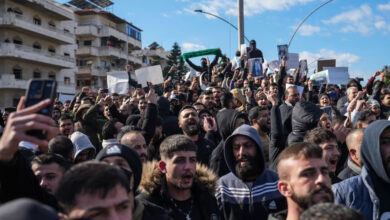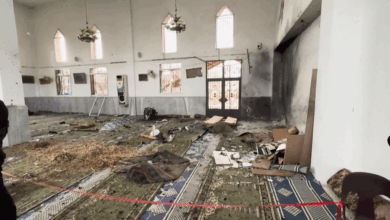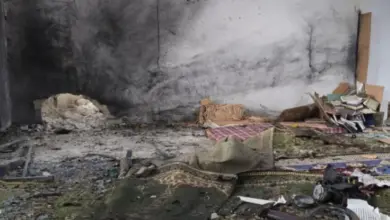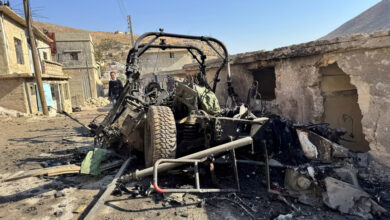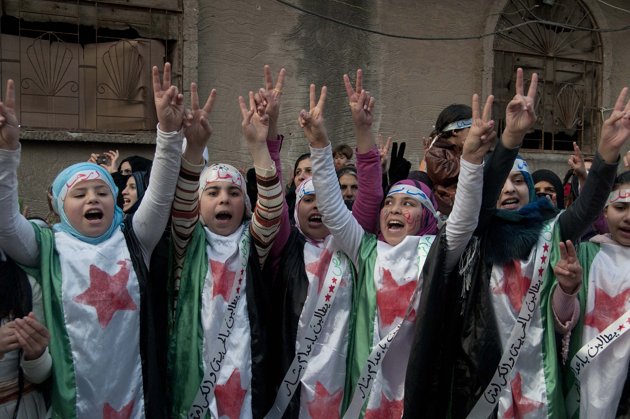
Pressure is mounting on the Arab League to seek UN intervention amid growing exasperation that the bloc's hard-won observer mission in Syria has failed to staunch 10 months of killing.
The US State Department said Friday it was so concerned at the growing death toll, as the Syrian regime cracks down on pro-democracy protests, that it is considering closing its embassy in Damascus.
"We have serious concerns about the deteriorating security situation in Damascus, including the recent spate of car bombs, and about the safety and security of embassy personnel," the State Department said in a statement.
"We have requested that the government of Syria take additional security measures to protect our embassy, and the Syrian government is considering that request," it added.
"We have also advised the Syrian government that unless concrete steps are taken in the coming days we may have no choice but to close the mission," the statement said.
Meanwhile, despite widespread criticism of the Arab League's observer mission, its deputy chief of operations, Ali Jarush, told reporters Friday that it was likely to be extended by a month.
The head of the mission on the ground, General Mohamed Ahmed Mustafa al-Dabi of Sudan, is preparing to report to Arab foreign ministers, who are to meet on Sunday in Cairo to discuss the next step.
"Everything indicates that the observer mission in Syria will be extended by a month," Jarush said in the Egyptian capital.
Human Rights Watch said the observers' presence had failed to rein in the Syrian regime's crackdown, with activists reporting 506 civilians killed and another 490 detained since the monitors first deployed on 26 December.
It urged the regional bloc "to publicly recognize that Syria has not respected the League's plan and work with the Security Council to increase pressure on the authorities and effectively curtail the use of fire power."
The head of the opposition Syrian National Council (SNC), Burhan Ghaliun, headed to Cairo to lobby Arab ministers to refer the observer mission's findings to the UN Security Council for tough action.
An SNC spokesman told AFP in Cairo that the group is "preparing a counter report" to the one Dabi is due to submit to the pan-Arab body.
Meanwhile, Ahmed al-Tayyeb, the grand imam of Cairo's Al-Azhar, the highest seat of Sunni Muslim learning, urged "Arab rulers to take the necessary measures to halt bloodshed in Syria," Egypt's state news agency MENA reported.
And Syrian protesters gathered outside the Russian embassy in Cairo to vent their anger over Moscow's support for President Bashar al-Assad's regime.
A tough Security Council resolution on Syria has been blocked by veto-wielding permanent members China and Russia. Moscow insists the opposition is as much to blame for the violence as the regime.
Deadlock in the Security Council over Syria has raised the stakes of an Arab solution to the crisis.
"Many Arab countries have rejected the idea of sending Arab troops to Syria," in line with a suggestion by Qatar, an Arab League official who declined to be identified said in Cairo ahead of Sunday's meeting of foreign ministers.
French Foreign Minister Alain Juppe said the Qatari proposal to send peacekeepers was not feasible "in the present regional context."
But President Nicolas Sarkozy insisted that France, the former colonial power in Syria, would not stand silently by in the face of a crackdown that the United Nations estimates has killed more than 5,400 people since March.
"We cannot accept the ferocious repression by the Syrian leadership of its people, a repression that has led the entire country into chaos, and a chaos that will help extremists of all kinds," he said.
In Syria, thousands of people poured out of mosques after Friday prayers to call for the ouster of Assad's regime, after choosing "Prisoners of the Revolution" as the slogan for this week's main protests.
They are demanding that the government deliver on its promise to the Arab League to release tens of thousands of people arrested since protests first erupted in March.
The Syrian Observatory for Human Rights said security forces came out in force and opened fire on protesters in flashpoint areas on Friday, killing at least five civilians.
In Bernex in eastern France, meanwhile, the funeral took place of French television journalist Gilles Jacquier, who was killed on 11 January in the central Syrian city of Homs during a press trip organized by the authorities.
The French daily Le Figaro said his death may have been caused by a blunder by the rebel Free Syrian Army, which is made up of deserters, but this theory was rejected by an FSA representative in Paris.

